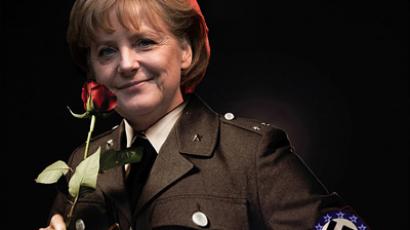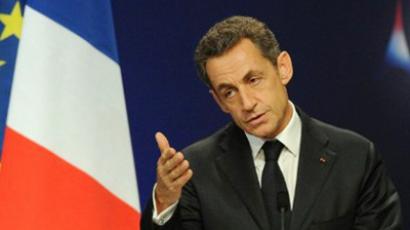Merkel gives EU the FU
German Chancellor Angela Merkel has urged for “a Fiscal Union with strict rules” to address the root causes of the “Europe's widening financial crisis.” Though she said the process will take years.
Germany and France, which are the key players of the eurozone, are pushing forward the idea of creating a Fiscal Union which would include all 17 eurozone states or even all members of the EU. It would bring more centralization of power, more control over state budgets, and more importantly over their debts."The European crisis will not be solved in one fell swoop,'' said Merkel to the lower house of the German parliament on Friday. “There are no quick and easy solutions.”She compared the process of solving the debt crisis to the marathon runners saying that “the one who starts fastest isn't necessarily the most successful. It is the one who is aware of what is involved in running the full distance."De facto, the introduction of such a Fiscal Union would also mean the revisal of the European Union.The UK, another key player of the EU – although not in the eurozone – also wants to take part in the reformation process. On Friday, French President Nicolas Sarkozy is meeting with British Prime Minister David Cameron, who is expected to voice support for the policy, as long as UK does not lose its influence in the process.Merkel’s address comes ahead of the EU summit in Brussels on December 9 where she and French President Nicolas Sarkozy plan to propose joint action."We are going to Brussels with the intention to change the EU treaty," Ms. Merkel said. "The goal is a fiscal union that enforces both fiscal discipline in its members and has the necessary instruments to effectively handle a crisis."The chancellor said that the goal of next week's summit is to change European treaties “to avoid a splitting of the eurozone and non-eurozone members."Angela Merkel stressed that Germany will not support the idea of the Eurobonds, where all 17 members of the eurozone would share the responsibility for their debts. France and Germany are calling for the introduction of tougher sanctions against those countries which cannot pay their bills.However, Merkel called for parliamentarians to realize what sacrifices people are making in countries not in the eurozone, like the Baltic states, Bulgaria and Romania, and "who don't get so much attention.” She said it is important to keep in mind the problems being faced by people in Spain, Portugal and especially in Greece.Earlier on Thursday evening Sarkozy also delivered as landmark speech to 5,000 cheering supporters, saying that France and Germany wanted “more solidarity and more discipline” in Europe. But Arjo Klamer, professor of the Economics of Art and Culture at Erasmus University, believes that the economic disparity between the members of the EU will not be solved by the “fiscal union”. “I think that what is needed is all Europeans are going to pay taxes to Brussels so there will be just like in most countries, like the US, what is called the automatic stabilizers. If you do bad you pay fewer taxes, receive more benefits. Nothing of that is in place here in Europe. Merkel’s planes are not addressing that serious shortcoming.”
EU stuck in euro straightjacket
The UK, another key player of the EU – although not in the eurozone – also wants to take part in the reformation process. On Friday, French President Nicolas Sarkozy is meeting with British Prime Minister David Cameron, who is expected to voice his support for the policy, as long as the UK does not lose its influence in the process. Although not part of the eurozone, the UK has already contributed some €7 billion to Ireland and €9 billion to Greece via the IMF mechanisms. And British taxpayers might have to contribute another €6 billion if Spain needs a bailout. “It is very unfair,” says Robert Oulds, the director of the Bruges Group. “In the situation when Britain is in a great deal of debt, the British government is having to bobble money from the financial markets to lend to other countries. This is something Britain can’t actually afford to do.”The problems are with the euro and it should be broken up into more manageable parts, believes Oulds who is against a more integrated Europe.“At the moment, the European economy is just stagnating because they stuck in the straitjacket of the European single currency,” he said.














